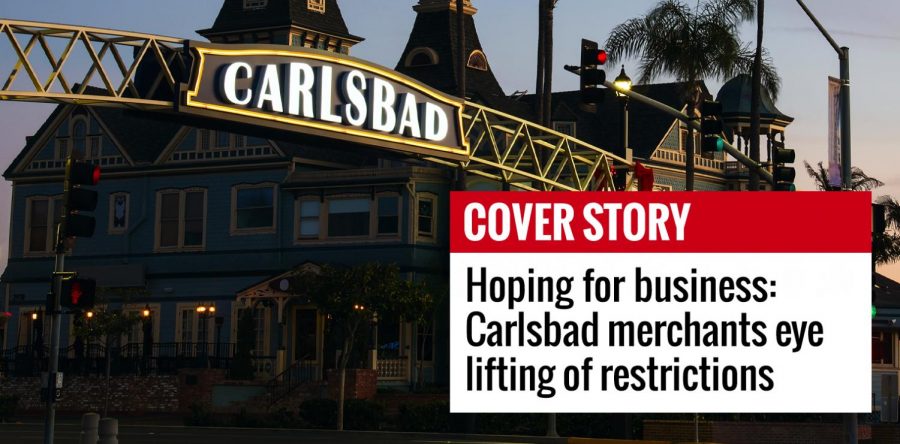Hoping for business: Carlsbad merchants eye lifting of restrictions
Carlsbad, a city that has long been fueled by its strong tourism and industrial sectors, faces an entirely different set of considerations when it comes to approaching business during the COVID-19 pandemic.
The city generates the second highest tourism revenue in San Diego County, according to Carlsbad Chamber of Commerce President and CEO Bret Schanzenbach. Carlsbad is home to 50 hotels, the Legoland theme park and hundreds of restaurants and other services that depend on the influx of visitors that come to town every summer and spring break.
“The tourism industry has been just decimated,” Schanzenbach said, adding that the spring break season was entirely wiped out and that tens of thousands of locals have been laid off as a result of the virus.

Legoland has been closed since March and does not have a planned reopening date, according to the theme park’s website. The San Diego Tourism Authority has rolled out a plan for eventually reopening local attractions such as Legoland, once public health guidance permits, by instilling regular temperature checks, cashless transactions and lessened attendance.
While parks and outdoor museums are being allowed to reopen under California state guidelines, theme parks still await the green light as of June 12. Legoland has a tentative opening date of July 1 depending on county and state decisions under Phase 3 of reopening.
In the meantime, Schanzenbach said, businesses are going to have to be flexible in order to make it through the pandemic. Many restaurants have been able to switch to contactless models to stay afloat, offering options such as curbside pickup, but he said these kinds of adjustments work better in some industries than others.
“It wasn’t that simple for some of our higher-end restaurants to do what they do well and switch to a model like that,” Schanzenbach said. “We’ve seen many that closed altogether and are just trying to ride it out.”
But even as many industries struggle, the Carlsbad Chamber of Commerce’s website features a list of more than 50 businesses that have been able to continue operating amid the pandemic. The latest reopening guidelines that allow for sit-in dining and open retail stores mean there are now many more businesses opening their doors.
Vince Grillo, owner of Carlsbad Ranch Market, said he’s been fortunate that his small grocery store is considered an essential business.
“I’ve been in that parking lot for 30-plus years,” Grillo said. “I’ve known my customers and have seen their babies grow and go off to college. I’ve seen a lot of them, unfortunately, disappear with age. So I kind of felt obligated to just be there and serve my customers like they’ve served me all these years.”
When the stay-at-home order began, Grillo said, the store was breaking sales records because people were panic buying. The store is just now starting to approach a normal level of business again, he said.
The location now has a handwashing station outside and has had to temporarily retire its popular self-service salad because of health department guidance, and will now be offering more premade salads.
As somebody who has been on the front lines of the pandemic by working for an essential business, Grillo said it’s been shocking to see how people interpret public health guidance differently.
“You get both extremes of customers,” Grillo said. “You get some who are super, super scared and then you get the other half where you wonder if they don’t have any internet or TV and they don’t really know what’s going on.”
Although many grocery stores are seeing an influx of business, the situation can be less promising for other kinds of food establishments.
Cookie Monster Collin Smith, a part-owner of Cravory Cookies, said the company’s Bressi Ranch location had to close after its in-person customer base became nearly nonexistent.
He said the effects of the pandemic came into focus on St. Patrick’s Day, which is usually one of its busiest holidays of the year.
“That was the week of the stay-at-home order, so we immediately went down from normally seeing 100 to 150 people a day to seeing zero to 10 people,” Smith said. “We offered curbside pickup, we offered takeout, but people in Carlsbad in particular were really following that order and staying home.”
The company’s Point Loma location remains open, although the future of the Carlsbad location remains unclear. Smith said the company lost 80 percent of its workforce once the pandemic hit.
Luckily, Smith said, Cravory Cookies has a competitive advantage in that it ships cookies nationwide through its website, which has helped the company to stay afloat during this tough time.
“People are sending gifts to their loved ones,” Smith said. “It’s been really fun to see people do Zoom calls and they share cookie experiences with each other. Or they send a gift to their mother for Mother’s Day.”
Bella Ross is a local freelance writer.
encinitas current, cardiff current




